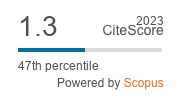Convergence and Disparities in European Industrial Relations
DOI:
https://doi.org/10.2478/cer-2013-0022Abstract
The aim of the article is to present the areas of the greatest convergence and disparities in industrial relations in the EU. This paper also aims to identify the causes of such situations and to determine the influence of the economic crisis on the shape of these relations and the attempt to achieve convergence. The study is composed of an introduction, three main sections and a conclusion. Following the introduction, the section 2 discusses the evolutionary process of European industrial relations and social dialogue. The next section is devoted to employee participation in the management of a company, the area of greatest convergence in industrial relations. Special emphasis is placed on the dual system of employee representation (trade unions and works councils), and in particular on the European Works Councils. The final section examines the greatest disparities between the old and new EU member states with reference to trade union density, range, and the level of collective bargaining. This is followed by a summary of conclusions.
Downloads
References
Dunlop J. T. (1958), Industrial Relations Systems, New York: Holt
Google Scholar
Dyrektywa Parlamentu Europejskiego i Rady z dnia 11 marca 2002 r. ustanawiająca podstawowe struktury informowania i konsultacji wśród pracowników we Wspólnocie Europejskiej, (2002), Dyrektywa Rady 2002/14/WE, Official Journal of the European Communities, L. 80/29
Google Scholar
Dyrektywa Rady dotycząca tworzenia europejskich rad zakładowych lub procedur informowania i prowadzenia konsultacji wśród pracowników w przedsiębiorstwach o zasięgu wspólnotowym lub grupach przedsiębiorstw o zasięgu wspólnotowym, (1994), Dyrektywa Rady nr 94/45/WE, Official Journal of the European Communities, No L252/64
Google Scholar
Dyrektywa Rady z dnia 8 października 2001 r. uzupełniająca Status Spółki Europejskiej w odniesieniu do uczestnictwa pracowników, (2001), Dyrektywa Rady 2001/86/WE
Google Scholar
ETUI ECD, (2012), http://ecdb.worker-participation.eu
Google Scholar
Employee involvement in Companies under the European Company Statute. Executive summary (2011), European Foundation for the Improvement of Living and Working Conditions
Google Scholar
Employee representation at establishment level in Europe (2009), European Company Survey, Dublin
Google Scholar
Fulton L. (2011), Worker Representation in Europe, Labour Research Department and ETUI (online publication)
Google Scholar
Gardawski J. (2009), Związki zawodowe między fordyzmem a postfordyzmem. Kryzys fordowskich związków zawodowych, [in:] J. Gardawski (ed.), Polacy pracujący a kryzys fordyzmu, Wydawnictwo Naukowe SCHOLAR, Warszawa
Google Scholar
Golimowska S., Żukowski M. (2008), Diversity, similarity and commonality: Member states’ social policies and EU social policy, [in:] S. Golinowska, P. Hengstenberg, M. Żukowski (ed.), Diversity and Commonality in European Social Policies: The Forging of a European Social Model, Wydawnictwo Naukowe Scholar, Warszawa
Google Scholar
Grosse T.G. (2007), Dialog społeczny i obywatelski w Unii Europejskiej, [in:] R. Towalski (ed.), Dialog społeczny. Najnowsze dyskusje i koncepcje, Centrum Partnerstwa Społecznego ʻDialogʼ, Warszawa
Google Scholar
Impact of the information and consultation directive on industrial relations (2008), European Foundation for the Improvement of Living and Working Conditions, Dublin
Google Scholar
Industrial Relations in Europe 2010 (2011), European Commission, Directorate-General for Employment, Social Affairs and Inclusion, Luxembourg
Google Scholar
Jagodziński R., Pas I. (2011), The ECC landscape on the eve of the transposition deadline of the recast directive 2009/38/EC, European Trade Union Institute, Brussels
Google Scholar
Kohl H. (2009), Freedom of Association, Employees’ Rights and Social Dialogue in Central and Eastern Europe and Western Balkans, Friedrich-Ebert-Stiftung, Berlin
Google Scholar
Morawski W. (2001), Socjologia ekonomiczna, Wydawnictwo Naukowe PWN, Warszawa
Google Scholar
OECD Database on Trade Unions
Google Scholar
Rybicka E. (2006), Jubileusz europejskiego dialogu społecznego, ʻDialogʼ, Warszawa, nr 10
Google Scholar
Skorupińska K. (2009), Rola rad zakładowych w krajowych i transnarodowych przedsiębiorstwach europejskich, Wydawnictwo Uniwersytetu Łódzkiego, Łódź
Google Scholar
Skorupińska K. (2011), European Works Councils Experiences, ʻComparative Economic Researchʼ, Łódź, Vol. 14
Google Scholar
Social dialogue in Times og global economic crisis (2012), European Foundation for the Improvement of Living and Working Conditions, Luxembourg
Google Scholar
Surdykowska B. (2011), Europejski dialog społeczny – okrągła rocznica, ʻDialogʼ, Warszawa, nr 3 (30)
Google Scholar
Towalski R. (2007), Dialog społeczny – próba definicji, [in:] R. Towalski (ed.), Dialog społeczny. Najnowsze dyskusje i koncepcje, Centrum Partnerstwa Społecznego ʻDialogʼ, Warszawa
Google Scholar
Traktat ustanawiający Wspólnotę Europejską, Dziennik Urzędowy Unii Europejskiej z 24 grudnia 2002 r.
Google Scholar
Workplace Representation (Slovenia), worker-participation.eu
Google Scholar
EWC database (2012), European Trade Union Institute
Google Scholar
ICTWSS database version 3, May 2011
Google Scholar
worker-participation.eu
Google Scholar
Downloads
Published
How to Cite
Issue
Section
License

This work is licensed under a Creative Commons Attribution-NonCommercial-NoDerivatives 4.0 International License.










